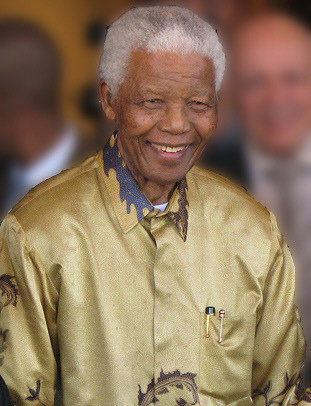Speaking out: An Act of Courage
Nelson Mandela’s Ideal Spoken words have power. The Nelson Mandela Foundation explains Mandela’s “I am prepared to die” speech and its context, the Rivonia Trial. He was sentenced to 27 years in jail: http://www.nelsonmandela.org/news/entry/i-am-prepared-to-die In the speech, Mandela spoke of his ideal, a “democratic and free society” for all. Search to find the full text of his speech and read the last page (and/ or other sections), preparing to share key parts with one or more classmates. In the speech, Mandela spoke of his ideal, a democratic and free society for all. As you read, reread and deliver the speech, what do you learn about speaking out and advocating for change? Recent news focuses on Nelson Mandela’s death on December 5 and his legacy. Read news reports, listen to radio broadcasts, watch films and read books about Nelson Mandela, and record all you learn. Draw from what you learn to complete the attached student guide sheets on COURAGE and HEROISM. Are other leaders in the news displaying courage? Who are those leaders? What are they doing? Apply the student sheets on COURAGE and HEROISM to what you learn about today’s leaders from newspapers. Another famous civil rights speech, rehearsed in Rocky Mount, was the subject of a daily blog delivered by NC’s Department of Cultural Resources. The blog is reprinted below with permission. Read aloud sections of Dr. King’s speech. Martin Luther King Jr.’s Rehearsal Speech in Rocky Mount By NC Cultural Resources On November 27, 1962, Martin Luther King, Jr., delivered a speech in Rocky Mount. Before a crowd of nearly 2,000 in the gymnasium at Booker T. Washington High School, King used a number of expressions that made their way into his landmark “I Have a Dream” address at the Lincoln Memorial, which was part of the March on Washington in August 1963. Near the close he built toward these lines: “I have a dream that one day right here in Rocky Mount, the sons of former slaves and the sons of former slave owners will meet at the table of brotherhood, knowing that one God brought man to the face of the Earth. I have a dream tonight that one day my little daughter and my two sons will grow up in a world not conscious of the color of their skin, but only conscious of the fact that they are members of the human race. . . .” Clayborne Carson, editor of the King Papers, notes that while this was not the first use of the “I have a dream” phrase, it “appears to be an important new rhetorical formulation.” By the spring and summer of 1963 the words were among the most frequent of King’s refrains. Other related resources:
- Photographs and documents related to African American Education from the State Archives and Charlotte Hawkins Brown Museum
- African Americans and Education on NCpedia
- Celebrate Black History! from the N.C. Department of Cultural Resources
- A Change is Gonna Come, an online exhbit from the N.C. Museum of History
- A History of African Americans in North Carolina from N.C. Historical Publications
- Resources related to black history from the State Library

